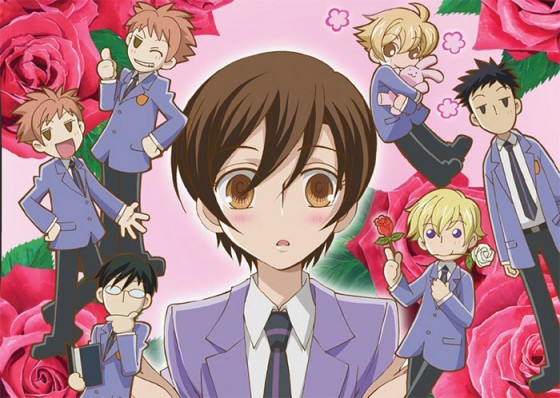Anime comedies, are absolutely willing to get self-referential, in some cases going full parody. Now, you can get a bad parody by shoving random jokes and references into the work because they can (the Seltzer & Friedberg films), or come from a place where you actively hate and dislike the genre they are satirizing, and in turn can end up creating works which are poor examples of that genre.
By comparison, the best parodies are those which are also good examples of the work in question, and such is the case with Ouran High School Host Club.
The show follows Haruhi Fujioka, a student at the titular high school, who ends up in debt to the host club after knocking over an incredibly expensive vase that the club was planning to auction to charity. To pay this debt, Haruhi is roped into being a host for the club – the catch being that Haruhi is a girl, with the club members not finding out about this until they are in the middle of turning her into a host.
The show itself ends up being something of a parody of modern shojo series aimed for fujoshi audiences, with each of the members of the club fitting into a particular BL archetype, something which the show itself calls attention to. One of the members of the supporting cast, Renge Houshakuji, effectively exists for the purpose of calling attention to genre conventions and archetypes, and in the process setting up jokes which builds on those archetypes.
This combination serves an excellent double purpose – the series works fairly well on its own as a shoujo romantic comedy, while also doing an excellent job of calling attention to these genre conventions and introducing them to audiences who might be unfamiliar to them. As an example, when Final Fantasy XV’s cast was revealed, and your party was shown to be free of female characters, there was a lot of backlash. However, as I was partway through Ouran at the time, and I was becoming familiar with the archetypes presented in the show, I was able to see similar archetypes in Final Fantasy XV, and in turn recognize pick up what the show was laying down – that while the party members were predominantly male, they were also designed to appeal to female players by playing into existing archetypes.
The humor in the show generally works. Haruhi, as someone who is unfamiliar with the genre conventions in play, and as she’s from a more average family and is attending Ouran High School – a super-elite private school – on a scholarship, becomes a double-outsider. She is in a position to call out the absurdities of shojo manga. Additionally, as with Hayate the Combat Butler, Haruhi is in the position of Hayate, as someone who is familiar with the everyday world and is a stranger to the rich and elite, and in turn can mock the other members of the host club for their sheltered upbringing and for “Exoctizing” the lives of people who are less well off than them.
The show is not without some very real issues. Haruhi’s father works in a Hostess bar where the hostesses are men who are dressed in drag, and this leads into a lot of transphobic material. Transphobic slurs are frequently thrown around Haruhi’s father (who does not identify as genderfluid), and one of his co-workers (who is less clear), and by members of the club (outside of Haruhi) in reference to those two characters. It really kills the mood in the scenes when these come up – especially in the personal context that I finished watching the series after having finished watching Moyashimon, which handles its transgender character much, much better.
Keeping that in mind, I did find the show incredibly funny outside of those moments where the show managed to spectacularly kill the mood, and I definitely get why the show built up such a significant fan following.
The series only received one season, which is available from Amazon & RightStuf on Blu-Ray (Amazon, RightStuf), and DVD (Amazon, RightStuf)

